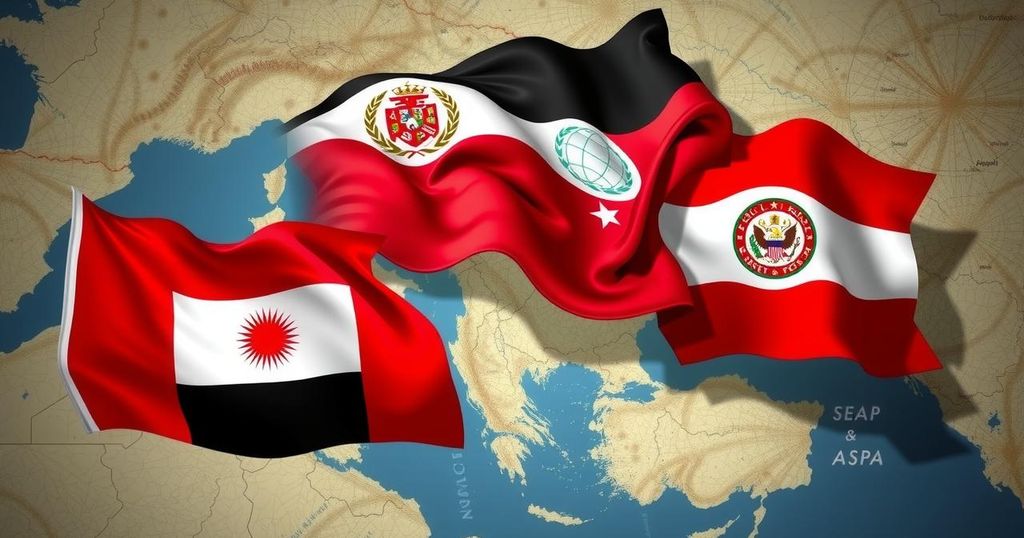Implications of Assad’s Fall: Regional Challenges and Opportunities in Syria
The article analyzes the implications of the Assad regime’s collapse in Syria, focusing on the opportunities and challenges for regional players post-civil war. It highlights U.S. expectations for an inclusive Syrian government, Turkey’s strategic ambitions, and the potential rise of extremist factions. Israel and Jordan’s security concerns are emphasized as regional stability hangs in the balance amid sectarian strife and geopolitical rivalry.
Syria’s shifting landscape post-Assad raises substantial questions regarding the implications for regional players, including Israel, America, Saudi Arabia, and Iran. Following the collapse of Bashar al-Assad’s regime, supported primarily by Russia and Iran’s Hezbollah, a coalition of rebel forces may now seek to establish control over a nation afflicted by a deadly civil war. With over 620,000 casualties, the prospects for a stable and inclusive governance structure remain tenuous amidst a backdrop of sectarian strife.
The U.S. maintains a watchful eye, with Secretary of State Antony Blinken articulating expectations for a Syrian-led transition towards an inclusive government. Blinken emphasized the need for respect for minority rights and the securing of chemical weapons, alongside humanitarian aid access. Despite these outlines of optimism, experts express deep concerns about the feasibility and sincerity of these developments.
Intriguingly, Ahmad al-Shara, leader of Hayat Tahrir al-Sham (HTS), navigates the complexities of rebel leadership, balancing claims of moderation against his history with extremist groups like Al-Qaeda. The pressures to gain international legitimacy stem from the potential lifting of sanctions that currently weigh heavily on Syria’s financial assets. Moreover, Turkey’s backing of HTS raises questions about its ambitions for extending influence, particularly against U.S. Kurdish allies.
In terms of geopolitical ramifications, Jordan fears that the rise of HTS might inspire local extremists, thereby threatening the stability of the region’s monarchies, crucial to American and Israeli interests. Additionally, Israel bolsters its defenses, conducting airstrikes to prevent arms from reaching hostile rebel factions or Iranian proxies.
The upheaval of the Assad regime represents a pivotal moment in Arab politics, with AJC analysts noting Syria’s lack of a unifying power center akin to Egypt’s military following Mubarak’s fall. Compounded by the Iranian regime’s evident vulnerability, these dynamics underscore a significant transformation in the regional order, further complicated by the fractured alliances among the various rebel factions.
The article discusses the evolving situation in Syria following the collapse of the Assad regime after 13 years of civil war, exploring the impact on regional stakeholders like Israel, the United States, Saudi Arabia, and Iran. It examines the role of external players such as Hezbollah and the implications of Turkey’s influence in supporting Syrian rebel factions. The dismantling of Assad’s regime raises concerns about sectarian strife, the potential for extremist groups to proliferate, and the economic ramifications tied to international sanctions. Further, it touches upon Israel’s security measures in response to perceived threats from the Syrian conflict, alongside broader Arab political dynamics in the context of the new developments in Syria.
The collapse of Bashar al-Assad’s regime marks a significant turning point in Syria’s future, laden with challenges for achieving lasting peace and stability. As rival groups vie for power, the potential for ongoing violence and instability looms large, prompting concerns from various regional and international actors. In light of the multipronged security concerns, maintaining an inclusive government that respects all societal segments is paramount for reducing sectarian tensions and achieving broader regional stability. The dynamics of Syrian politics will invariably influence the strategic calculations of neighboring countries, especially in relation to security and humanitarian efforts.
Original Source: www.ajc.org




Post Comment